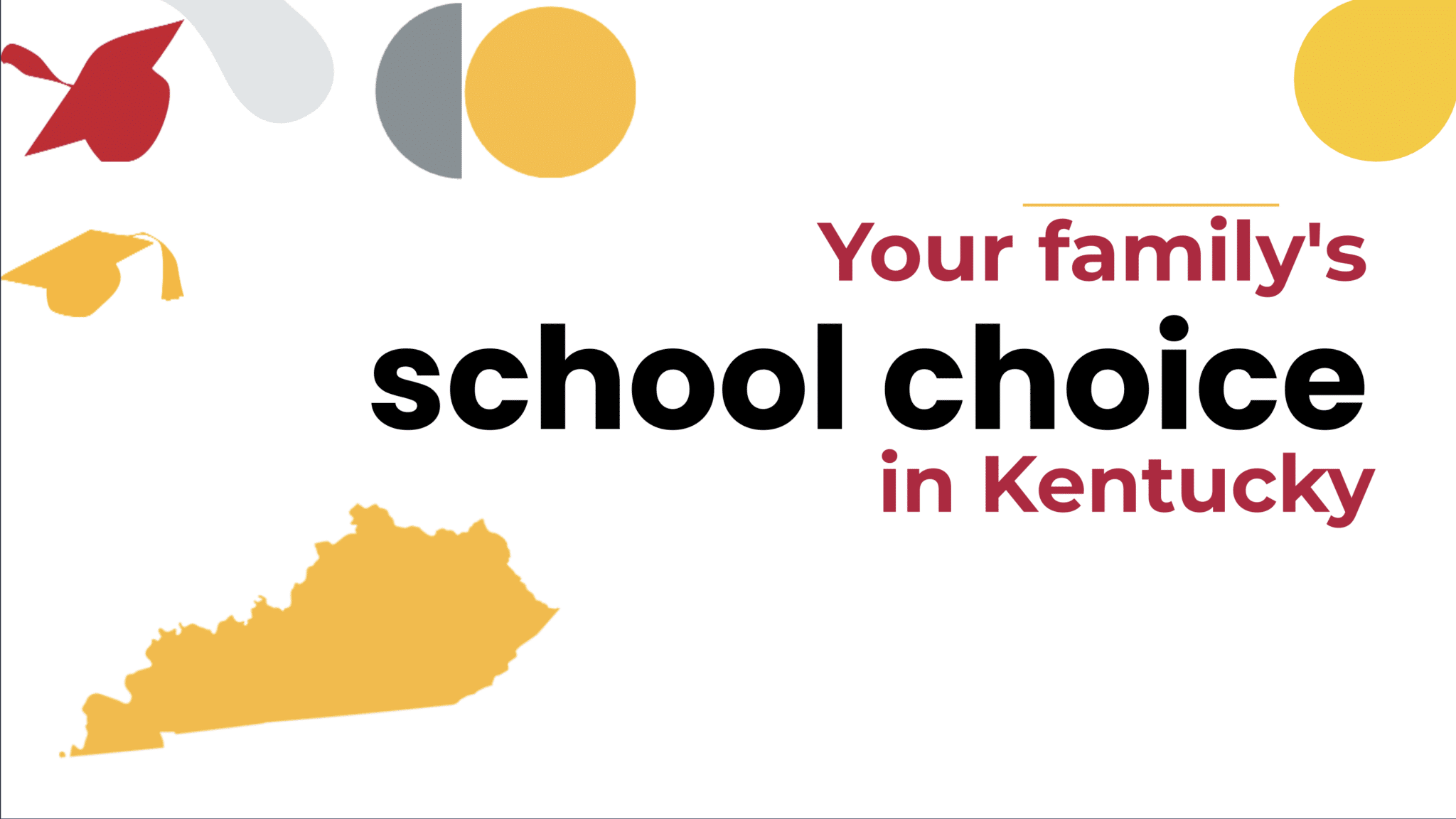Choosing a school? You’ve got options.
If you live in Kentucky and face a K-12 education decision for your child, this post is for you. Where you send your child to school impacts whether they are inspired, happy, and equipped for success (no pressure, right?). You may have more school options than you realize! This post will breakdown the types of school choice available to you in Kentucky, as well as provide additional education resources.
In Kentucky, you can choose from traditional public schools, public magnet schools, private schools, online learning, homeschooling, and microschooling and mix-and-match learning.
Looking for special education options? You can learn what special education services are available in Kentucky at the Ultimate Guide to Special Education.

- Traditional Public Schools
- Public Charter Schools
- Public Magnet Schools
- Private Schools
- Online Schools
- Homeschool
- Microschooling
Kentucky Traditional Public Schools
Most children (79.3%) in Kentucky attend traditional public schools. Traditional public schools are free to attend, open to all students, operated by school districts, and funded by taxpayers like you. On average, Kentucky spends $12,126 per public school student each year.
Kentucky has more than 170 public school districts and flexible open enrollment for public school. What this means is that in many cases you can choose to send your child to a public school in your district other than the one you have been assigned. Additionally, as of July 2022, all Kentucky families are able to apply to public schools in other districts. The receiving district can set capacity limits, but must otherwise have a policy allowing for admission of non-resident students. If you would like to participate in open enrollment, contact your local district to learn more. In some cases, receiving districts in Kentucky charge fees for out-of-district students.
Open enrollment is a valuable school choice. Just remember to ask the deadline and application process for any public school district you are interested in transferring into. For example, open enrollment in Fayette County Public Schools usually takes place after spring break each year. Additionally, keep in mind that high school students who transfer may be required to wait a year before participating in athletics at their new school.
Find out more about public schools in your state at Kentucky’s Department of Education. If you live in Jefferson County, the largest school district in Kentucky, note that the district’s assignment plan will be dramatically changing starting in the 2023-2024 school year. “Choice zones” will be established to give families more options near their homes and expand magnet offerings.
Kentucky Charter Schools
Currently, there are no charter schools in Kentucky because permanent funding for charters was not approved until spring 2022. Although funding measures were approved, in December 2023, the bill was considered unconstitutional.
Charter schools are tuition-free public schools that have the freedom to innovate while being held accountable for student achievement. Each school has a charter which explains the school’s purpose and what specific community need it serves, whether that be providing a language immersion program or offering a rigorous, literacy-based curriculum. If there are more families seeking admittance to a charter school than there are seats, a lottery system is usually used to determine admittance.
You can learn more at the Kentucky Department of Education.
Kentucky Magnet Schools
Magnet schools are free public schools that allow kids to focus on specific themes, like science or the performing arts. Kentucky has a variety of magnet schools and programs spread throughout the state serving 6.6% of the K-12 student population, including in Mason County School District, Fayette County Public Schools and Jefferson County Public Schools. Fayette County Public Schools, for instance, describes how it has magnet schools with these focuses: “Biomedical sciences (Frederick Douglass High School); International Baccalaureate Diploma Programme (Tates Creek High School); traditional programs (LTMS); individually prescribed education (Dixie); Spanish immersion (Maxwell and Bryan Station middle and high); science, technology, engineering, arts, and math (STEAM Academy and Rise STEM Academy for Girls); and curriculum taught through the lens of African-American history and culture (Carter G. Woodson academies).” And, while not a full magnet school, Central High School offers Louisville students a chance to participate in a pre-medical magnet program.
Kentucky Private Schools
Families in Kentucky can also consider private schools, nonpublic schools that charge tuition. In Kentucky, 8.9% of all K-12 students are enrolled in private. Private schools may offer a unique curriculum, smaller class sizes, or a faith-based tradition. Kentucky’s more than 380 private schools come in all shapes and forms, from religious schools to schools designed for children with special needs. The average tuition for private schools in the state is $6,941 for elementary schools and $8,077 for high schools.
In 2021, Kentucky created a unique private school choice program. Through it, low-income families would be eligible for flexible funding to use at a public or private school of their choosing. This program, the nation’s first education savings account program funded by tax-credit donations, was ruled unconstitutional in 2022. However, other privately funded scholarships may be available.
Learn more at EdChoice KY, the Catholic Conference of Kentucky, and Private School Review: Kentucky.
Kentucky Online Learning
Whether your child wants to accelerate his or her learning or needs a quieter environment in which to focus, you may be interested in giving virtual school a try. Kentucky currently has one free state-wide online school, Kentucky Virtual Academy, available for grades K-11. Part-time or full-time courses may also be available at a cost via Barren Academy of Virtual and Expanded Learning (BAVEL), The Corbin School of Innovation, or Jefferson County Public Schools eSchool. In some cases, schools may cover costs for a student’s online courses. More information on these paid options is available on the Kentucky Department of Education website.
There are also some district online learning programs, such as Hardin County Schools Online Academy, Success Academy’s Virtual Learning Center, Christian County Public Schools Virtual Learning Academy, Kenton County School District Virtual Learning Program, Jessamine County Virtual Learning Academy, Fleming County Performance Academy, and Bullitt Virtual Learning Academy.
Plus, there are private, full-time online schools that are available for a fee in all 50 states, such as George Washington University Online High School, The Keystone School, Excel High School, and K12 Private Academy.
To read more about online learning in Kentucky, check out the Digital Learning Collaborative’s state profile.
Kentucky Homeschooling
Homeschooling is another school option; it is the process of parents educating students at home. Families in all 50 states can homeschool. As technology and school choices have spread in Kentucky, homeschooling is an increasingly popular choice with more support than ever.
In Kentucky, 5.2% of all K-12 students are homeschooled. Notice of your intent to homeschool is required annually within two weeks of the school year beginning or ten days prior to starting if you are starting mid-year. This notification should be sent to the superintendent of the local school board. It is recommended that you formally withdraw from your public school so your student is not marked truant. (Note that since there isn’t a homeschool statute in Kentucky, homeschool families technically operate under the private school statute.)
If you choose to homeschool, you are required to teach specific subjects (like reading, writing, math, and history) but specific standardized tests are not required. In general, children who are homeschooled may face roadblocks if they want to participate in public school sports or activities in Kentucky. However, you can always look for other leagues or co-ops near you!
Homeschool parents are required to report basic information such as names and ages of students, but local school districts are never allowed to demand information that is not legally required. You can find a great how-to at the Home School Legal Defense Association about homeschooling in Kentucky. You may also wish to check out Christian Home Educators of Kentucky.
Kentucky Microschools and Mix-and-Match Learning
Today, many Kentucky families are mixing and matching school options to come up with new ways to personalize education. Microschools are one of these ways. A microschool refers to students gathering together in a small group – with adult supervision – to learn, explore, and socialize. Microschools can take a variety of shapes and legal forms, from homeschoolers coming together at an enrichment center to a private school committed to small classrooms. What microschools share in common is a commitment to small-group learning and close-knit relationships, along with an emphasis on children as individual learners.
Here are a couple examples of microschools and related resources in Kentucky:
Wilmore Crossing Academy is a microschool with intentionally small class sizes that are often held outdoors.
Sphinx Academy is a full-time microschool in Lexington for gifted and talented highschoolers.
Remember, microschooling is more a mentality than a specific legal distinction in most cases. Often, a family participates in a microschool while legally homeschooling, or being enrolled in a private or online school.
Search for Schools Near Me
Microschooling and Mix-and-Match Learning
How can it empower parents and help kids achieve their dreams?
7 Step Guide
Tips to help you find a school where your daughter or son will learn, succeed, and be happy.
Education Resources for
Kentucky Parents
For additional information about school choices in
Kentucky, visit these resources:
Every state is different when it comes to school choice options.
Sign up below to get a detailed comparison:
"*" indicates required fields
